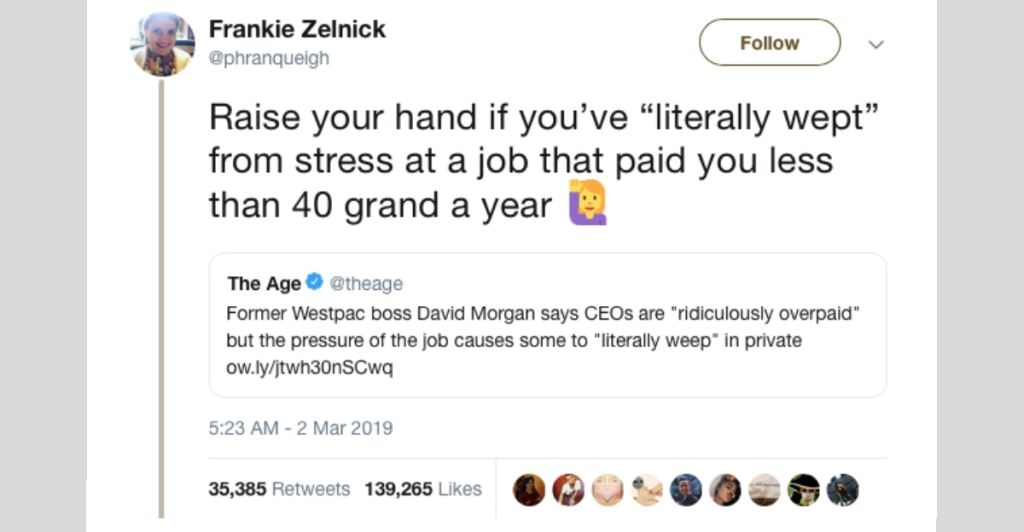A former bank boss tried to justify inflated CEO salaries because the job is stressful. The people of Twitter were not having it.
There’s no doubt that running a company is a tough job. Holding the fate of hundreds or thousands of employees and the weight of success or failure of a business on your shoulders is definitely a big source of stress.
But how much more valuable is one person’s stress than another?
That’s the question Dr. David Morgan, former CEO of Australia’s Westpac Banking Corporation, inadvertently addressed in an interview for a new biography. According to The Age, Morgan told the book’s author, Oliver Brown, that the reality of CEO life is “seldom openly discussed.”
“Most people don’t talk about it honestly,” Morgan said. “Yes, CEO life is very glamorous. You’re recognized, you’re given the best seats in restaurants, and you’re ridiculously overpaid. But you need stamina. As the leader, you rarely play the grand final, but more an endless succession of semi-finals.”
“You can hardly ever relax, and that creates intense strain,” he added. “Behind closed doors, some CEOs literally weep.”
And that was the straw that broke Twitter’s back.
People who have ‘literally wept’ over stress at jobs where they made under $40K a year showed up by the thousands.
Dr. Morgan was the CEO of Westpac from 1999 to 2008. In 2007, his annual pay topped $10 million. That’s $833,000 a month, $192,000+ a week, or assuming a 7-day work week, $27,000+ per day. If he worked 16-hour days every single day (which is surely not the norm, but let’s go with it for the sake of the stressful argument), that’s $1,700+ per hour.
But sometimes they weep in private, right?
At least Morgan admitted that CEOs can be “ridiculously overpaid.” But trying to justify that with multimillionaire tears totally falls flat for the multimillions of people who work in stressful, underpaid jobs every day.
Twitter user Frankie Zelnick illustrated this point with a simple tweet in response to The Age’s article share.
“Raise your hand if you’ve ‘literally wept’ from stress at a job that paid you less than 40 grand a year,” she wrote.
The responses rolled in like thunder.
There is zero evidence that the more stress you have in a job, the more you get paid. In fact, as several people pointed out, the less they got paid at a job, the more they cried.
An entire thread could have been dedicated to the pay/tears ratio of teachers.
Unless you have tried to educate a classroom full of kids, it’s hard to understand the amount of stress that goes along with the job. I started out as a teacher and while it’s a rewarding career in many ways, it’s also the hardest job I’ve ever had—and one of the worst paid per actual working hour. Every teacher I know has “literally wept” over their jobs, many while working other jobs to make ends meet.
What stressed out millionaires don’t recognize is how much stress is caused by not having financial security.
Some users shared stories of how they couldn’t afford to take time off work, even for medical reasons.
Others pointed out the ocean of difference between crying over a stressful job when you have more than enough money and crying over a stressful job when you’re poor. There’s just no comparison.
When your work includes business meetings over rounds of golf and tables at 5-star restaurants, followed up by going home to a luxurious house that you can afford to pay someone to clean, and a retirement account worth more than most of us will make in our whole lifetimes, it’s hard to feel sorry for you, no matter how hard your job is.
Running a company is stressful, but so are millions of other people’s jobs that pay a tiny fraction of what most CEOs make—and without the perks. Dr. Morgan easily could have retired in comfort after his 9-year stint as Westpac’s CEO. Most of us have to work our butts off for our entire adult life to be able to stop working and still have food on the table.
So yeah. We know CEOs have tough jobs, but the teachers, social workers, non-profit employees, retail associates, and other underpaid, overstressed workers aren’t going to lose any sleep over anyone’s $1,000+/hr tears.





































